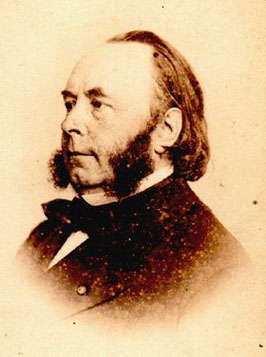| Edmond Frémy  Born: 28-Feb-1814 Born: 28-Feb-1814
Birthplace: Versailles, France
Died: 3-Feb-1894
Location of death: Paris, France
Cause of death: unspecified
Gender: Male
Race or Ethnicity: White
Occupation: Chemist Nationality: France
Executive summary: Discovered hydrogen fluoride French chemist, born at Versailles on the 28th of February 1814. Entering Gay-Lussac's laboratory in 1831, he became préparateur at the École Polytechnique in 1834 and at the Collège de France in 1837. His next post was that of répétiteur at the École Polytechnique, where in 1846 he was appointed professor, and in 1850 he succeeded Gay-Lussac in the chair of chemistry at the Museum d'Histoire Naturelle, of which he was director, in succession to Michel-Eugène Chevreul, from 1879 to 1891. He died at Paris on the 3rd of February 1894. His work included investigations of osmic acid, of the ferrates, stannates, plumbates, etc., and of ozone, attempts to obtain free fluorine by the electrolysis of fused fluorides, and the discovery of anhydrous hydrofluoric acid and of a series of acides sulphazotés, the precise nature of which long remained a matter of discussion. He also studied the coloring matters of leaves and flowers, the composition of bone, cerebral matter and other animal substances, and the processes of fermentation, in regard to the nature of which he was an opponent of Louis Pasteur's views. Keenly alive to the importance of the technical applications of chemistry, he devoted special attention as a teacher to the training of industrial chemists. In this field he contributed to our knowledge of the manufacture of iron and steel, sulphuric acid, glass and paper, and in particular worked at the saponification of fats with sulphuric acid and the utilization of palmitic acid for candle-making. In the later years of his life he applied himself to the problem of obtaining alumina in the crystalline form, and succeeded in making rubies identical with the natural gem not merely in chemical composition but also in physical properties.
Teacher: École Polytechnique, Paris (1834-37)
Professor: Collège de France (1837-46)
Professor: École Polytechnique, Paris (1846-50)
Do you know something we don't?
Submit a correction or make a comment about this profile
Copyright ©2019 Soylent Communications
|